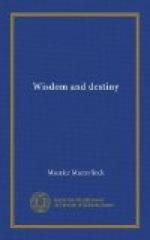it is easy. If you live among those who daily
call blessing on life, it shall not be long ere you
will call blessing on yours. Smiles are as catching
as tears; and periods men have termed happy, were
periods when there existed some who knew of their
happiness. Happiness rarely is absent; it is we
that know not of its presence. The greatest felicity
avails us nothing if we know not that we are happy;
there is more joy in the smallest delight whereof
we are conscious, than in the approach of the mightiest
happiness that enters not into our soul. There
are only too many who think that what they have cannot
be happiness; and therefore is it the duty of such
as are happy, to prove to the others that they only
possess what each man possesses deep down in the depths
of his heart. To be happy is only to have freed
one’s soul from the unrest of happiness.
It were well if, from time to time, there should come
to us one to whom fortune had granted a dazzling, superhuman
felicity, that all men regarded with envy; and if he
were very simply to say to us, “All is mine
that you pray for each day: I have riches, and
youth, and health; I have glory, and power, and love;
and if to-day I am truly able to call myself happy,
it is not on account of the gifts that fortune has
deigned to accord me, but because I have learned from
these gifts to fix my eyes far above happiness.
If my marvellous travels and victories, my strength
and my love, have brought me the peace and the gladness
I sought, it is only because they have taught me that
it is not in them that the veritable gladness and
peace can be found. It was in myself they existed,
before all these triumphs; and still in myself are
they now, after all my achievement; and I know full
well that had but a little more wisdom been mine,
I might have enjoyed all I now enjoy without the aid
of so much good fortune. I know that today I am
happier still than I was yesterday, because I have
learned at last that I stand in no need of good fortune
in order to free my soul, to bring peace to my thoughts,
to enlighten my heart.”
53. Of this the sage is fully aware, though no
superhuman happiness may have descended upon him.
The upright man knows it too, though he be less wise
than the sage, and his consciousness less fully developed;
for an act of goodness or justice brings with it a
kind of inarticulate consciousness that often becomes
more effective, more faithful, more loving, than the
consciousness that springs into being from the very
deepest thought. Acts of this nature bring, above
all, a special knowledge of happiness. Strive
as we may, our loftiest thoughts are always uncertain,
unstable; but the light of a goodly deed shines steadily
on, and is lasting. There are times when deep
thought is no more than merely fictitious consciousness;
but an act of charity, the heroic duty fulfilled—these
are true consciousness; in other words, happiness
in action. The happiness of Marcus Aurelius,
who condones a mortal affront; of Washington, giving




